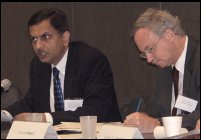Registration
You will receive an email confirming your registration.
On September 11, 2002, the Carnegie Endowment for International Peace and the Cordell Hull Institute convened a meeting to discuss the liberalization of agricultural trade, an issue critical both to the success of WTO Doha Round negotiations and to the development prospects of many poor countries and people.
While significant progress has been made since World War II in liberalizing international trade in industrial products, agriculture has long been treated as a "special case" for which price supports, subsidies, and protectionist policies remain the norm in industrial economies. The resulting distortions of production, consumption, and trade in the agricultural sector are immense, and have a range of detrimental effects. Resource poor developing country farmers, as well as small farmers in many industrial nations, find their livihoods and way of life threatened as they must struggle to compete with world market prices which are often artificially low. The promotion of intensive-farming methods is also damaging to our environment, causing increased pollution, soil degradation, and rising concerns over losses of biodiversity and the safety of certain foods.
In the multilateral trade arena today, the Agreement on Agriculture (AoA) and the launch of Doha Round negotiations provide a basis for needed liberalization of trade in agricultural products to move forward. For progress to occur in a manner that benefits people, a concerted effort must be made by the United States, the Cairns Group and other developing countries, and a wide range of civil society interests, including development advocates and practitioners, environmental and consumer groups, and academics and other trade-policy specialists.
This conference sought to bring together members of such interested parties to clarify some of the issues that will have to be confronted in the Doha Round negotiations on agriculture.
_______________________________________________________________
AGENDA OF THE MEETING
William D. Rogers: Senior Partner, Arnold & Porter, attorneys-at-law, and Vice Chairman, Cordell Hull Institute, Washington, DC; former Under Secretary of State for Economic AffairsJohn Audley: Senior Associate and Director of the Trade, Equity and Development Project, Carnegie Endowment for International Peace, Washington, DC
0830-0900 Registration and Coffee
0900-0930 FIRST SESSION (Keynote Address)
Integrating Developing Countries in the WTO System
Luis de la Calle: Director-General, Public Strategies de México Inc., Mexico City; former Under Secretary for International Trade Negotiations, Mexican Ministry of Economy
0930-1100 SECOND SESSION
Perspectives on Liberalizing Agricultural Trade
C. Joseph O'Mara: President, O'Mara & Associates, Washington, DC; former Special Agricultural Trade Negotiator, U.S. Department of Agriculture, on modalities for WTO negotiations on agricultural trade
Shishir Priyadarshi: Senior Counselor, Development Division, WTO Secretariat, Geneva on the proposals for a "development box" in the liberalization of agricultural trade, with Rashid Kaukab, Director of the South Center, Geneva.
Marcos Jank: Special Expert, Trade Integration and Regional Programs, Inter-American Development Bank, Washington, DC, and Professor of Agricultural Economics, University of Saõ Paulo, Brazil, on revising the WTO rules on market access and trade-distorting subsidies.
1130-1300 THIRD SESSION
General Discussion of Agricultural Trade Issues
Moderator: Hugh Corbet, President, Cordell Hull Institute
Phil Twyford: Head, Washington Office, Oxfam International, Oxford, England, on the thrust of the recent Oxfam report on the WTO system, Rigged Rules and Double Standards (2002).Eugenio Diaz-Bonilla: Senior Research Fellow, International Food Policy Research Institute, Washington, DC, and former Argentine trade official, on the developing countries interest in agricultural trade liberalization.
Kathy Ozer: Executive Director, National Family Farms Coalition, Washington, DC on the place of family farms in the liberalization of agricultural trade.
Richard Haire: Chief Executive, Queensland Cotton Corporation, Brisbane, Australia, on a Cairns Group farmer's perspective on competing in world markets.Bruce Gardner: Professor of Agricultural Economics, University of Maryland, and former U.S. Assistant Secretary of Agriculture, on how the interests of developed countries can be served while opening to imports from developing countries.
1300-1400 Buffet Luncheon
Broadening the Coalition for Liberalizing Farm Trade
Allen Johnson: Chief Agricultural Negotiator, Office of the U.S. Trade Representative, Executive Office of the President of the United States
Identifying Common Ground and Points of Difference
Rashid Kaukab: Director of the South Center, GenevaEugenio Diaz-Bonilla: Senior Research Fellow, International Food Policy Research Institute, Washington, DC, and former Argentine trade official
David Orden: Professor of Agricultural and Applied Economics, Virginia Polytechnic Institute, Blacksburg, Virginia; co-author of Policy Reform in American Agriculture (1998)
_______________________________________________________
